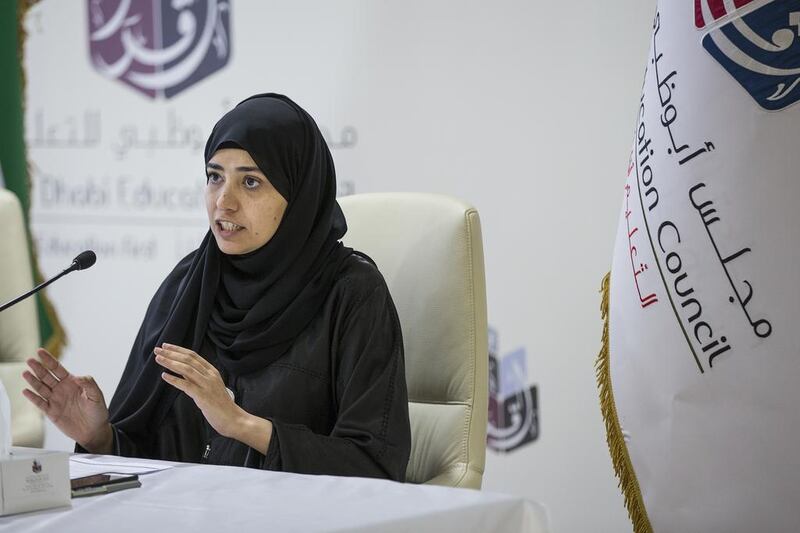ABU DHABI // A new curriculum, exams for pupils and an “elite” stream for gifted children are part of an ambitious, comprehensive overhaul of the country’s education system.
The reforms, designed by the Ministry of Education, on Monday received the approval of Sheikh Mohammed bin Rashid, Vice President and Ruler of Dubai.
They aim to revise the curriculum, enhance skills, introduce new subjects, improve evaluations of schools, and better watch pupils’ progress with mid-year and end-of-year exams.
Sheikh Mohammed called on all to fulfil their responsibilities towards the new generation: “We are counting on the teachers and the Ministry of Education to help school education make a great leap forward.
“There is no room for excuses. We look forward to developing a new generation of students that is equipped to use the tools of the future.”
New subjects include technology, design innovation design, health science, career guidance, general skills and business management.
The curriculum will gradually be made bilingual and focus on deepening national identity, building critical thinking and innovation, and developing teamwork and problem solving.
There will be a new integrated kindergarten curriculum, evaluations for pre-schools and an integrated reading programme for students of all grades.
International partnerships will develop new mathematics and science textbooks, and subjects such as history, geography, economy and social studies will be integrated.
IT and programming will be introduced in primary and secondary schools, and English will be overseen by specialists from Cambridge University and the ministry.
Teachers will be trained to develop their skills in line with international standards.
Sheikh Mohammed said he would monitor progress with President Sheikh Khalifa and Sheikh Mohammed bin Zayed, Crown Prince of Abu Dhabi and Deputy Supreme Commander of the Armed Forces.
Meanwhile, the Abu Dhabi Education Council announced on Monday that pupils in Grade 10 will no longer be able to choose subjects, while those in higher grades will have some choice of science classes.
High school pupils in the emirate will have new subjects including digital technology, innovation, and weekly classes to provide the life skills needed for tertiary education or work.
“The goal is to align the students’ outcomes with the goals of the UAE,” said Dr Karima Al Mazroui, Adec’s acting executive director.
The curriculum for Grade 10 pupils, who are between 14 and 16, will comprise Arabic, English, Islamic studies, social studies, mathematics, Earth and space science, biology, chemistry and physics.
“Nothing can be dropped, nothing can be elected,” said Dr Al Mazroui.
But pupils will be allowed to choose between advanced or general levels of maths and physics.
For those in Grades 11 and 12, compulsory subjects will include English, maths, science, Islamic education, social studies and Arabic.
They will be offered electives but “the selection will be between the sciences – physics, chemistry, biology and Earth sciences”, Dr Al Mazroui said.
High school pupils will also have two 45-minute periods of physical education a week, but no art or music lessons.
Dr Al Mazroui said the two subjects had never been part of the high school curriculum and would probably be introduced when the Abu Dhabi School Model reached Grade 10.
The ADSM, which Adec launched in 2010, has introduced maths and science classes in English, while the rest were taught in Arabic. It also shifted from rote learning to critical thinking and ICT skills.
This year the ADSM has reached Grade 9, so pupils at that level will be taught in a language other than Arabic for the first time. They will learn arts, music and digital technology and innovation.
Pupils in Grades 10, 11 and 12 are taught only in Arabic presently.
“To empower our teachers, Adec has trained more than 12,000 people in the new curriculum and how to use resources in more effective ways,” said Sara Al Suwaidi, Adec’s manager for teaching and curriculum.
“One of the more important things that distinguishes the new ninth-grade curriculum is that maths and science will now be taught in English. This is also the first year we will introduce arts and music in Grade 9.”
Ms Al Suwaidi said educators were also preparing to introduce moral and ethical studies across all grades, as directed by Sheikh Mohammed bin Zayed. She said details of the new course would be announced soon.
rpennington@thenational.ae
*with Wam






